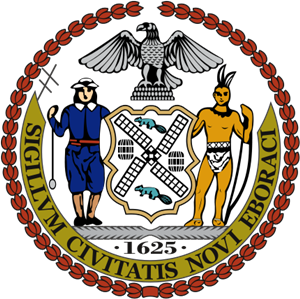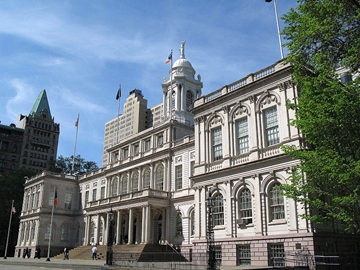November 24, 2015 •
New York City Councilwoman Announces Resignation
Councilwoman Maria Carmen del Arroyo has announced her plans to resign from the position effective December 31, 2015. Arroyo released a statement citing “pressing family needs” as her reason for stepping down, but it has been reported that the move […]
 Councilwoman Maria Carmen del Arroyo has announced her plans to resign from the position effective December 31, 2015. Arroyo released a statement citing “pressing family needs” as her reason for stepping down, but it has been reported that the move has been made for a potential jump to the private sector.
Councilwoman Maria Carmen del Arroyo has announced her plans to resign from the position effective December 31, 2015. Arroyo released a statement citing “pressing family needs” as her reason for stepping down, but it has been reported that the move has been made for a potential jump to the private sector.
Arroyo’s resignation will trigger a special election for the open seat. Mayor Bill de Blasio will have until three days after the vacancy to declare a date for a special election.
November 16, 2015 •
New Campaign Finance Legislation Introduced in New York City
New legislation was introduced impacting the city’s campaign finance regulations. One bill would eliminate the possibility of matching, with public funds, any contribution to a candidate for local office that is bundled by a lobbyist or person who has, or […]
 New legislation was introduced impacting the city’s campaign finance regulations. One bill would eliminate the possibility of matching, with public funds, any contribution to a candidate for local office that is bundled by a lobbyist or person who has, or may have, business dealings with the City.
New legislation was introduced impacting the city’s campaign finance regulations. One bill would eliminate the possibility of matching, with public funds, any contribution to a candidate for local office that is bundled by a lobbyist or person who has, or may have, business dealings with the City.
A second bill would extend the prohibition on the acceptance of contributions from non-registered political committees to candidates who are not participating in the public money matching program. Currently, the prohibition only applies to candidates who are participating in the public matching program.
Photo of the New York City skyline by AngMoKio on Wikimedia Commons.
October 16, 2015 •
New York City Lobbying Rules Are Replaced
The Office of the City Clerk has published new rules to the city’s lobbying law following a public comment period and summerlong review by the Law Department. The rules require a lobbyist or client to designate a principal officer to […]
 The Office of the City Clerk has published new rules to the city’s lobbying law following a public comment period and summerlong review by the Law Department. The rules require a lobbyist or client to designate a principal officer to electronically file the registration and reports by enrollment in the city’s online e-Lobbyist system.
The Office of the City Clerk has published new rules to the city’s lobbying law following a public comment period and summerlong review by the Law Department. The rules require a lobbyist or client to designate a principal officer to electronically file the registration and reports by enrollment in the city’s online e-Lobbyist system.
While the rules allow for a designee or compliance officer to assist the principal officer in completing reports, they prohibit a principal officer from sharing his or her e-Lobbyist password. The rules also detail the procedure for enrolling in e-Lobbyist; provide requirements for retainers and authorization letters; indicate when filing extensions may be obtained; provide procedures for obtaining a waiver of late filing penalties; establish enforcement procedures; and create an amnesty program. The amnesty program would allow certain violators of the lobby law to come into compliance without penalty if meeting the eligibility criteria.
The rules are effective November 4, 2015.
July 15, 2015 •
Proposed Rules to New York City’s Lobbying Law
The Office of the City Clerk has proposed amended rules to chapter 1 of title 51 of the Rules of the City of New York pursuant to the enactment of Local Law 129 of 2013, which amended the city’s lobbying […]
 The Office of the City Clerk has proposed amended rules to chapter 1 of title 51 of the Rules of the City of New York pursuant to the enactment of Local Law 129 of 2013, which amended the city’s lobbying law.
The Office of the City Clerk has proposed amended rules to chapter 1 of title 51 of the Rules of the City of New York pursuant to the enactment of Local Law 129 of 2013, which amended the city’s lobbying law.
The rules propose the following: set forth the procedure for enrolling in e-Lobbyist; define the roles of principal officer, designee, and compliance officer; provide requirements for retainers and authorization letters; indicate when filing extensions may be obtained; set forth the procedures for obtaining a waiver of late filing penalties; establish enforcement procedures; and create an amnesty program.
The amnesty program sets forth eligibility criteria for lobbyists and clients who have not previously complied with the city’s lobbying law, allowing such individuals to come into compliance without penalty for a given period of time.
A public hearing was held and the proposed rules are still under consideration by the Lobbying Bureau.
January 22, 2015 •
New Regs from NYC Campaign Finance Board Effective 1/20/15
The New York City Campaign Finance Board’s newly approved rules permitting candidates enrolled in the public matching funds program to receive contributions via text message took effect January 20, 2015. The rules permit public funds to match the text message […]
 The New York City Campaign Finance Board’s newly approved rules permitting candidates enrolled in the public matching funds program to receive contributions via text message took effect January 20, 2015.
The New York City Campaign Finance Board’s newly approved rules permitting candidates enrolled in the public matching funds program to receive contributions via text message took effect January 20, 2015.
The rules permit public funds to match the text message contribution once those contributions are paid via the contributor’s phone bill.
The rules further establish record keeping requirements for text message contributions and a process to certify the identity of the contributor.
Photo of Manhattan courtesy of AngMoKio on Wikipedia.
December 17, 2014 •
Hacking Attempt Against NYC Campaign Finance Board’s Email System
The New York City Campaign Finance Board experienced a phishing attack of its email system this morning. The board instructs any users who have received an email from any staff member referencing an “Invoice Paid” in the subject line to […]
 The New York City Campaign Finance Board experienced a phishing attack of its email system this morning.
The New York City Campaign Finance Board experienced a phishing attack of its email system this morning.
The board instructs any users who have received an email from any staff member referencing an “Invoice Paid” in the subject line to delete the message immediately. Call (212) 409-1800 with questions.
December 11, 2014 •
NYC Campaign Finance Board Approves Rules Related to Text Message Contributions
In its December 11, 2014, meeting, the New York City Campaign Finance Board approved rules implementing Local Law 116 of 2013, which permits candidates receiving public matching funds to receive contributions via text message. The rules permit public funds to […]
 In its December 11, 2014, meeting, the New York City Campaign Finance Board approved rules implementing Local Law 116 of 2013, which permits candidates receiving public matching funds to receive contributions via text message.
In its December 11, 2014, meeting, the New York City Campaign Finance Board approved rules implementing Local Law 116 of 2013, which permits candidates receiving public matching funds to receive contributions via text message.
The rules permit public funds to match the text message contribution once those contributions are paid via the contributor’s phone bill. The rules further establish record keeping requirements for text message contributions and a process to certify the identity of the contributor.
The rules will take effect 30 days after final publication in The City Record.
November 17, 2014 •
NYC Campaign Finance Board Proposes Rules on Contributions by Text Message
The New York City Campaign Finance Board has proposed rules regulating political contributions by text message. The rules set forth the eligibility requirements for public funds matching of text message contributions, the process of record keeping requirements for such contributions, […]
 The New York City Campaign Finance Board has proposed rules regulating political contributions by text message. The rules set forth the eligibility requirements for public funds matching of text message contributions, the process of record keeping requirements for such contributions, and requirements of contributors to certify their identities when making text message contributions.
The New York City Campaign Finance Board has proposed rules regulating political contributions by text message. The rules set forth the eligibility requirements for public funds matching of text message contributions, the process of record keeping requirements for such contributions, and requirements of contributors to certify their identities when making text message contributions.
The rules are open for public comment until November 20, 2014. A public hearing is scheduled for Monday, November 24, 2014 at 10:00 a.m.
The New York City Council is considering a measure increasing disclosure requirements for those making independent expenditures to influence city elections. Introduction 148 will require individuals and entities making independent expenditures totaling $5,000 or more to disclose the owners, partners, […]
 The New York City Council is considering a measure increasing disclosure requirements for those making independent expenditures to influence city elections. Introduction 148 will require individuals and entities making independent expenditures totaling $5,000 or more to disclose the owners, partners, board members, or their equivalents of any entity reporting the expenditure. The measure further requires an individual or entity who transfers $1,000 or more to another individual or entity for the purpose of such other individual or entity making independent expenditures to report the transfer of money as if the transferor has directly made the independent expenditure.
The New York City Council is considering a measure increasing disclosure requirements for those making independent expenditures to influence city elections. Introduction 148 will require individuals and entities making independent expenditures totaling $5,000 or more to disclose the owners, partners, board members, or their equivalents of any entity reporting the expenditure. The measure further requires an individual or entity who transfers $1,000 or more to another individual or entity for the purpose of such other individual or entity making independent expenditures to report the transfer of money as if the transferor has directly made the independent expenditure.
Another provision of the measure requires individuals or entities to disclose detailed information on any electioneering communications, such as the top five donors to the entity responsible for the communication, and names of the owner and CEO of the entity.
Amy Loprest, the executive director of the New York City Campaign Finance Board, applauded the new disclosure requirements, saying, “This legislation will give voters a more complete view of who is paying for the campaign ads that fill their mailboxes and airwaves.”
If passed, Introduction 148 will take effect one year after its enactment.
May 16, 2014 •
New York City Amends Lobbying Law, Effective May 16, 2014
In late 2013, the New York City Council passed Local Law 129 of 2013, making many changes to current lobbying law in the city and surrounding boroughs. Many of the new law’s provisions are effective today, May 16, 2014. The […]

In late 2013, the New York City Council passed Local Law 129 of 2013, making many changes to current lobbying law in the city and surrounding boroughs. Many of the new law’s provisions are effective today, May 16, 2014.
The definition of lobbying is revised to include attempts to influence legislation not yet introduced, legislation at the state and federal level, and mayoral executive vetoes. It is also revised to include attempts to influence the agenda or calendaring of a meeting of a board or commission. The revised definition excludes architects and engineers as lobbyists under certain parameters, and the law now imposes a $10,000 registration threshold for such individuals should they undertake lobbying activities. The registration threshold for all other lobbyists is $5,000.
Local Law 129 of 2013 requires more detailed disclosure on the statement of registration and on periodic reports. The new law further establishes a first-of-its-kind amnesty program, allowing noncomplying lobbyists to enroll in the program and be exonerated of late filing fees and applicable civil and criminal penalties dating back to December 10, 2006.
Provisions taking effect in the future include a mandatory lobbyist training program and the practice of the city clerk reviewing sources of information such as state lobbyist filings and the Doing Business Database to identify lobbyists required to register who have not done so.
Photo of the New York City Hall courtesy of Momos on Wikimedia Commons.
State and Federal Communications, Inc. provides research and consulting services for government relations professionals on lobbying laws, procurement lobbying laws, political contribution laws in the United States and Canada. Learn more by visiting stateandfed.com.


